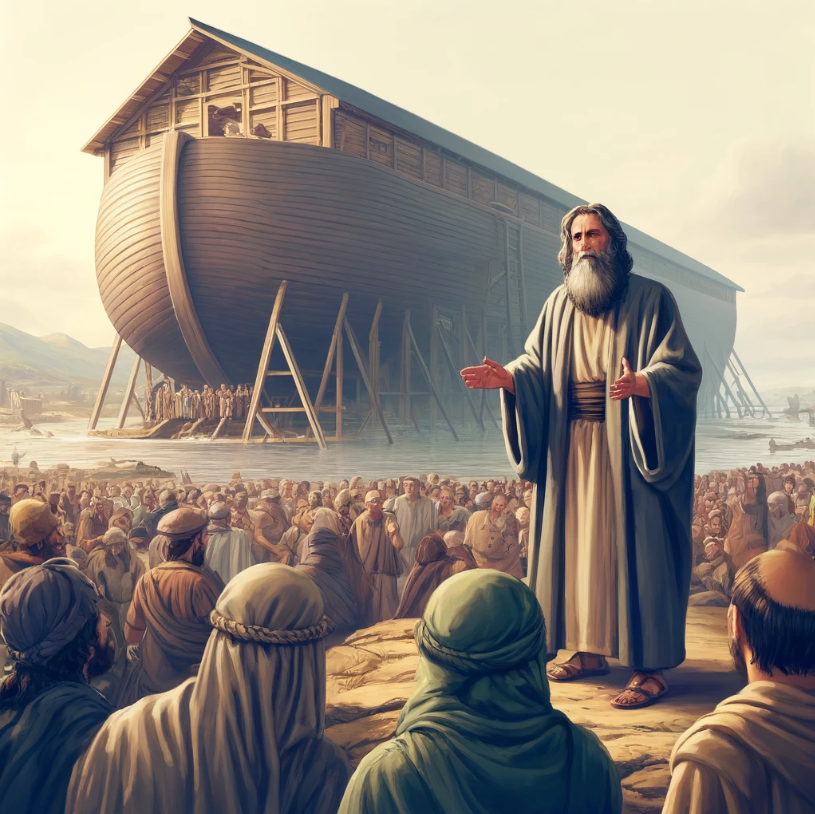Welcome to our journey through the cherished stories and figures of the Bible. Here, we celebrate the lives of those who walked in faith before us, offering us guidance and wisdom through their experiences. As you browse through the articles below, you’ll encounter familiar faces and stories that have been passed down through generations, each filled with lessons of love, courage, and faith. These stories aren’t just old tales; they are part of our daily lives, helping us to make decisions that reflect our beliefs and values. We invite you to explore the simple truths that these biblical heroes teach us, understanding how their lives can illuminate our own paths today. Let the stories of Abraham’s trust, Moses’ leadership, and David’s heart inspire you to live a life rich in faith and love.

Where in the Bible Does It Say Noah Preached for 120 Years?
The idea that Noah preached for 120 years comes from interpreting Genesis 6:3, where God mentions that "My spirit shall…

Where in the Bible Did Jesus Heal the Blind Man?
In the Bible, Jesus healed a blind man in the Gospel of John 9:1-12. John 9:1-12 And as Jesus passed…

Where in the Bible Is Mary Magdalene Mentioned?
Mary Magdalene is mentioned in the following passages of the Bible: Matthew 27:56: Among them were Mary Magdalene, Mary the…

Where in the Bible Are the Beatitudes Found?
The Beatitudes are found in the Bible in the Gospel of Matthew, chapter 5, verses 1-12. Matthew 5:1-12 And seeing…

Where in the Bible Did Jacob Wrestle with God?
The story of Jacob wrestling with God is found in Genesis 32:24-26 Genesis 32:24-26 And Jacob was left alone; and…

Where in the Bible Is the Prodigal Son Parable?
The Parable of the Prodigal Son is found in the Bible in the Gospel in Luke 15:11-32. Luke 15:11-32 In…

Where in the Bible Did John Baptize Jesus?
John baptized Jesus in the Jordan River, as described in the Bible in Matthew 3:13-17. Mateo 10:3 Then cometh Jesus…

Where in the Bible Is Jezebel Discussed?
Jezebel is discussed in the Books of 1 Kings and 2 Kings in the Old Testament of the Bible. Specifically,…

Where in the Bible Can I Find the Story of Sodom and Gomorrah?
The story of Sodom and Gomorrah is found in the Book of Genesis, chapters 18 and 19. Genesis 19:24-25 Then…

Where in the Bible Did Peter Walk on Water?
Peter walked on water in the Bible in the Book of Matthew, specifically Matthew 14:29. Matthew 14:29 And he said,…

Where in the Bible Can I Find the Sermon on the Mount?
The Sermon on the Mount can be found in the Bible in the Gospel of Matthew 5-7. Specifically, it begins…

Where in the Bible Was David Anointed as King?
David was anointed as king in 1 Samuel 16:1-13. 1 Samuel 16:1-13 And the Lord said unto Samuel, How long…

Where in the Bible Was Jacob’s Name Changed to Israel?
Jacob's name was changed to Israel in Genesis 32:28. Genesis 32:28 And he said, Thy name shall be called no…

Where in the Bible Was the Veil Torn?
The tearing of the veil is mentioned in the New Testament at the moment of Jesus' death. It is found…

Where in the Bible Was Jesus Baptized?
Jesus was baptized in the Jordan River by John the Baptist. This event is mentioned in the Gospel of Matthew…

Where in the Bible Was Jesus Angry?
Jesus expressed anger in the Bible most notably in the Gospel of Mark 11:15-17, when he cleansed the Temple by…

Who Were the Giants in the Bible?
In the Bible, "giants" refer to several groups and individuals mentioned in different contexts: Nephilim: Described in Genesis as the…

Where in the Bible Was Jesus Tempted by Satan?
Jesus was tempted by Satan in the wilderness, as described in Matthew 4:1-11, Mark 1:12-13, and Luke 4:1-13. Matthew 4:1-11…

Where in the Bible Is the Story of David and Goliath?
The story of David and Goliath is found in the Book of 1 Samuel, Chapter 17, in the Bible. The…

Where in the Bible Are Shadrach, Meshach, and Abednego Found?
Shadrach, Meshach, and Abednego are found in the Book of Daniel, specifically in Daniel 3:12 Daniel 3:12 There are certain…

Where in the Bible Did Jesus Feed 5000?
Jesus feeding the 5,000 is recorded in the Gospel of John 6:1-14. John 6:1-14 After these things Jesus went over…

Where in the Bible Was Jesus Tempted by the Devil?
Jesus was tempted by the devil in the wilderness, as described in the Gospels of Matthew 4:1-11, Mark 1:12-13, and…

Where in the Bible Did Peter Deny Jesus?
Peter denied Jesus three times in the Gospels of Matthew 26:69-75, Mark 14:66-72, Luke 22:54-62, and John 18:15-27. Each account…

Where in the Bible Does It Say God Is a Jealous God?
In the Bible, it says God is a jealous God in Exodus 20:5 and Deuteronomy 5:9. Exodus 20:5 You shall…

Where in the Bible Was Jesus Transfigured?
Jesus was transfigured in the Gospels of Matthew 17:1-2, Mark 9:2-3, and Luke 9:28-29. Matthew 17:1-2 And after six days…

Where in the Bible Is the Story of Samson?
The story of Samson is found in the Book of Judges, chapters 13 to 16. Judges 13:5 For, lo, thou…

Where in the Bible Did Jesus Calm the Storm?
Jesus calmed the storm in the Gospel of Mark 4:35-41. Mark 4:35-41. And the same day, when the even was…

Where in the Bible Did Noah Build the Ark?
Noah built the Ark as instructed by God in the Book of Genesis, specifically in Genesis 6:14-22. Genesis 6:14-22 Make…
Who Are the Key Figures in Biblical Stories?
The Bible is rich with characters who have profoundly shaped religious, moral, and cultural narratives around the world. Among these key figures are:
- Adam and Eve: Representing the dawn of humanity, their story introduces themes of innocence, temptation, and consequence.
- Abraham: Known as the father of many nations, Abraham’s faith and covenant with God are central themes in Judaism, Christianity, and Islam.
- Moses: A pivotal figure who leads the Israelites out of Egyptian bondage and to whom the laws of God were given, including the Ten Commandments.
- David: An archetype of a flawed yet heartful leader, David’s life encompasses heroism, artistic expression, deep faith, and complex personal failings.
- Mary: The mother of Jesus, revered for her piety and grace, plays a crucial role in the Christian narrative of Jesus’ life and salvation.
- Jesus Christ: Central to Christian teachings, his life and teachings offer lessons on love, redemption, and forgiveness.
- Paul the Apostle: Influential in spreading Christianity and authoring much of the New Testament, his writings and journeys have had a lasting impact on Christian theology and practice.
These figures and many others provide a complex tapestry of virtues, vices, trials, and triumphs that continue to influence contemporary life.
How Do Biblical Stories Shape Our Cultural Understanding?
Biblical stories have shaped cultures worldwide, influencing laws, traditions, moral decisions, and daily human interactions. They serve as foundational texts for millions, deeply impacting societal norms and individual ethics. Here’s how:
- Moral Frameworks: Stories such as the Good Samaritan or the Prodigal Son impart moral lessons that underscore virtues like mercy, forgiveness, and repentance.
- Legal and Social Systems: Biblical narratives have influenced legal frameworks and social policies, embedding concepts of justice, equality, and responsibility into civil codes.
- Art and Literature: Biblical themes permeate Western art and literature, inspiring countless works from Dante’s «Divine Comedy» to Michelangelo’s Sistine Chapel paintings.
- Interpersonal Relations: The biblical commandments to love one’s neighbor and do unto others as you would have them do unto you are echoed in many cultural and personal interactions.
Through these stories, the Bible continues to offer a lens through which to view the world, encouraging a communal sense of what is just, right, and compassionate.
Why Do These Stories Still Resonate Today
The enduring power of biblical stories lies in their profound ability to speak to the fundamental aspects of human experience—love, betrayal, sacrifice, hope, and redemption. Here’s why they remain relevant:
- Universal Themes: Themes like redemption, suffering, and triumph are universal, offering insights into the human condition that are as applicable today as when they were written.
- Personal and Spiritual Reflection: These stories provide frameworks for personal contemplation and spiritual growth, allowing individuals to explore deeper meanings in life.
- Community and Identity: For many, these stories are a cornerstone of cultural and religious identity, providing a shared history that strengthens community bonds.
- Ethical Dilemmas: Biblical stories often present complex moral dilemmas that challenge readers to consider ethical questions and develop personal virtues in response to them.
As cultures continue to evolve, biblical stories remain relevant, offering new interpretations and insights that resonate with the timeless aspects of human nature. Their ability to adapt to contemporary issues and inspire countless generations attests to their profound depth and enduring appeal.
